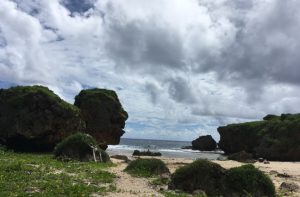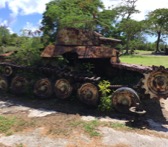Saipan’s Land and Sea: Battle Scars & Sites of Resilience is a 1-week program led by a project team comprised of educators, historians, archaeologists, authors, and cultural guides from the CNMI and across the US. Saipan’s land and seascape hold battle scars from both Japanese and US military during the Battle for Saipan. This is a 1-week residential program that provides K-12 educators an incomparable opportunity to interact with a continuous, intact, and largely undisturbed record of conflict history outside of museum walls on the island of Saipan.
Landmarks demonstrate sites of resilience from the civilian experience of indigenous Chamorro and Carolinians and Okinawan and Japanese. These enduring landmarks provide a view of WWII history and heritage from multiple perspectives and voices.
Planned topics: Indigenous History of NMI & Contemporary Life in the Pacific, Community Experiences Before Battle For Saipan, Civilian Experiences During Battle For Saipan, Battle For Saipan: Military Perspectives, CNMI Involvement in US War on Japan, Veteran & Community Experiences, & Conflict History
Planned site experiences: Kalabera Cave, Old Man by the Sea, Forbidden Island, Bird Island, CNMI Museum, Civilian Caves. Japanese Jail & military tunnels, Sugar King Park, American Memorial Park, Airport Sites, Military tunnels, The Last Command, Banzai Cliff, Suicide Cliff, Veterans’ Cemetery, and several Underwater heritage sites (see: World War II Maritime Heritage Trail: Battle of Saipan)
Planned pedagogical topics: Best Practices for Using Historical Fiction, Children’s Literature, Oral Storytelling & Personal Histories, Matching Standards with Place-based Learning, Teaching Conflict History, & Digital StoryMaps


Saipan’s Land and Sea: Battle Scars & Sites of Resilience has been made possible in part by a major grant from the National Endowment for the Humanities: Democracy demands wisdom. In conjunction with East Carolina University, This program will be offered twice during July 2023.
Dates: July 5-11 OR July 12-18, 2023
Format: Residential
Application Deadline: March 3, 2023
Participant Stipend: $1,300 (after successful completion of the program)
Tentative Schedule for each 1-week program:
| Day 1 (Wednesday) | |
| 9-11 AM | Program Orientation |
| 1-4 PM | Landmark Visit |
| 6-8 PM | Lecture and Film |
| Day 2 (Thursday) | |
| 9-11 AM | Pedagogical Session |
| 1-4 PM | Pedagogical Session |
| 6-8 PM | Cultural Event |
| Day 3 (Friday) | |
| 9-11 AM | Landmark Visit |
| 1-4 PM | Landmark Visit |
| 6-8 PM | Film and Discussion |
| Day 4 (Saturday) | |
| 9-11 AM | Landmark Water Visit |
| 1-4 PM | Landmark Water Visit |
| 6-8 PM | Optional Cultural Event |
| Day 5 (Sunday) | |
| 9-11 AM | Optional Sightseeing |
| 1-4 PM | Optional Sightseeing |
| 6-8 PM | Lecture and Discussion |
| Day 6 (Monday) | |
| 9-11 AM | Pedagogical Session |
| 1-4 PM | Pedagogical Session |
| 6-8 PM | Film and Discussion |
| Day 7 (Tuesday) | |
| 9-11 AM | Pedagogical Session |
| 1-4 PM | Landmark Visit |
| 6-8 PM | Program Closing Activities |
Any views, findings, conclusions, or recommendations expressed in this program do not necessarily represent those of the National Endowment for the Humanities.


This program has been made possible in part by a major grant from the National Endowment for the Humanities: Democracy demands wisdom and East Carolina University.